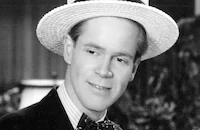Chicago Calling
Cast & Crew
John Reinhardt
Dan Duryea
Mary Anderson
Gordon Gebert
Ross Elliott
Melinda Plowman
Film Details
Technical Specs

Synopsis
After staying out all night drinking, Los Angeles photographer William R. Cannon comes home to discover his wife Mary and daughter Nancy packing to leave him. Bill, who cannot hold a job or quit drinking, desperately tries to convince Mary to stay, but she sadly refuses. Even though Bill will not be able to find a job without his camera, he pawns it in order to pay for Mary's trip, then bids Mary and Nancy a painful goodbye and wanders the streets all night so that he will not have to watch them leave. By the time Bill returns home a few days later, phone engineer Jim is waiting to unhook the telephone. Before Jim can finish, however, Bill finds a telegram from Mary explaining that Nancy has been seriously injured in a car accident outside Chicago, and that she will call the next afternoon after the operation. Desperate to receive the call, Bill begs Jim not to take the phone, promising to find the $50 to pay the bill before the next day. Jim explains that the line has already been disconnected, but agrees to leave the phone for twenty-four hours. Bill spends the next few hours asking his friends, banks and loan companies for help, but, with no collateral, he cannot secure any credit. Later, at a corner stand, a sympathetic waitress takes pity on him and gives him five dollars. Just then, Bill's dog, Smitty, is slightly wounded when young Bobby Kimball hits him with his bike. Heartbroken, Bobby follows Bill home and there reveals that his sister Babs is about to marry and place him in an orphanage. Bill informs the boy about his own troubles, and Bobby immediately offers the sixty dollars he has saved from his job. With no other options, Bill accepts Bobby's loan, promising to pay it back as soon as possible. They go to Bobby's home and sneak into his bedroom, where Babs's fiancée Art is sleeping, and when they cannot find the savings, Babs admits that she has hidden it from Bobby. Witnessing her rough treatment of the boy, Bill attempts to convince her to be kinder, but Babs will not listen. He leaves but is followed again by Bobby, who soon reveals that he has stolen Art's bankroll, planning to replace it later with his own savings. Bill at first argues but finally rushes the money to the phone company, only to find it closed for the night. Dejected, he spurns Bobby's continued attentions, then relents and takes the boy to a baseball game that evening. There, an excited Bobby loses the money, and after the lost and found clerk locates it, he comments to Bill that he must live a moral life to deserve the lucky break. The remark touches Bill and prompts him to return to Bobby's in the middle of the night in order to restore the money to Art. When Art finds him there, however, he throws Bill out and reports him to the police while Babs hits Bobby. In the streets, Bill finds a construction crew and begs the manager for a job, finally impressing him with his determination. He labors all night in order to earn enough money to call the Chicago police the next morning, but they cannot locate Nancy at any of the city hospitals. Meanwhile, Bobby awaits Bill at his apartment, and when Jim shows up, the little boy pleads with him to help Bill. When Bill returns home, he finds that Jim has reinstated the line for another hour. Just then, however, the police arrive to arrest Bill. They lead him outside, but when the phone rings, he breaks away and takes the call. The police and Bobby listen as Bill receives the news from Mary that Nancy has died. Seeing that Bill is shattered, the compassionate detectives call their sergeant to straighten out Bill's charge, and then leave. Not realizing that a terrified Bobby is following him, Bill drifts aimlessly through the city, stepping in front of cars as if he wants to be killed. When he reaches the train tracks, Bobby, certain Bill has thrown himself in front of the oncoming car, sobs uncontrollably. A switchman carries him over to Bill, who snaps out of his despair when he sees the broken-hearted child. In answer to the switchman's question, Bill replies that Bobby is his son, and the two walk away hand in hand.

Director
John Reinhardt
Cast

Dan Duryea

Mary Anderson

Gordon Gebert

Ross Elliott

Melinda Plowman
Judy Brubaker
Marsha Jones
Roy Engel
Bob Fallon
Grace Loman
Carl Vernell
Chuck Flynn
Jean Harvey
Bud Stark
Dick Curtis
Mel Pough
Eleanor Radcliff
Bill Lechner
Steve Pendleton
Roy Glen
Rudy Mckool
Gene Rogh
Norman Field
Lorin Raker
Mark Lowell
Crew
Peter Berneis
Peter Berneis
Milton Carter
David Chudnow
William L. Edwards
Robert De Grasse
Lee Greenway
Kurt Hirsch
Winston Jones
Joseph Justman
Boris Leven
Rudy Mckool
Arthur H. Nadel
Joseph Paul
John Reinhardt
Heinz Roemheld
George Sawley
Frank Webster
Clem Widrig

Film Details
Technical Specs

Quotes
Trivia
Notes
The working title of this film was Person-to-Person. Chicago Calling was the only production of Arrowhead Pictures. Some scenes were shot on the streets of Los Angeles, CA. Although an April 1951 Hollywood Reporter news item adds Keith McConnell to the cast, and the June 1951 Hollywood Reporter production chart adds Jo Carroll Dennison and Iris Adrian to the cast, their appearance in the final film has not been determined.












